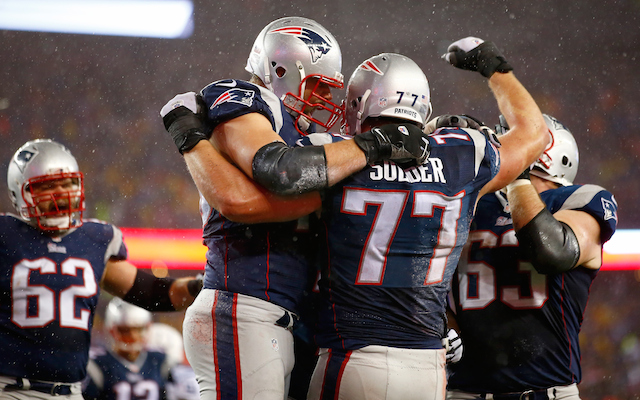Patriots' Nate Solder: I played in 2014 after testicular cancer diagnosis – CBSSports.com
 Solder played 2014 after an offseason testicular cancer diagnosis. (Getty Images)
Solder played 2014 after an offseason testicular cancer diagnosis. (Getty Images)
Nate Solder is a star NFL offensive lineman in his prime, which makes it flat-out stunning to find out he played 2014 after a diagnosis of testicular cancer.
Solder revealed the news in an interview with Mike Reiss of ESPN Boston, speaking about his experience in the hope to spread awareness during April, which is National Testicular Cancer Awareness Month.
April is also a year since Solder’s diagnosis, when he was stunned to find out about having cancer despite feeling healthy as ever.
“I knew nothing about it. It was a complete surprise,” Solder said. “You Google something like that and it kind of scares you, so I was like, ‘I’m not going to freak out about this.’ Had I not had a routine physical, I probably wouldn’t have checked it, saying, ‘Oh, it’s just in my head, I’m going to be fine.'”
Instead, doctors found the cancer, which was isolated to one testicle, removed the testicle and cleared Solder to play football.
He played pretty well, too. Solder started 16 games at tackle in a season where Tom Brady was sacked 21 times (the fewest since 2010) and the Patriots would go on to win the Super Bowl.
Pretty good year, with Solder topping it off by passing along an important message about health awareness.
“I was completely healthy, I’m a professional athlete. It can happen to anybody,” Solder said. “Make sure you get yourself checked out, especially young men, because that’s who it’s really targeted toward.”
Solder credits his teammates for their support — he visited the hospital every three months to follow up on the surgery and received what he said was an amazing amount of support — as well as his Christian faith in helping him through the process.
But most importantly? Awareness.
“The biggest thing is letting people know and giving them the information. And maybe giving people some courage that if they are in a situation like I was, maybe they would go and say something, and that could make a difference,” he said.
“It’s more common than people realize. A lot of people are either afraid to do it, or they don’t think it’s important enough to get it checked. It’s a simple check. Six months, a year, and then it starts spreading and then you start to feel symptoms and it’s a more serious situation. So that’s a big thing; you can save lives with early detection.”
This entry passed through the Full-Text RSS service – if this is your content and you’re reading it on someone else’s site, please read the FAQ at fivefilters.org/content-only/faq.php#publishers.